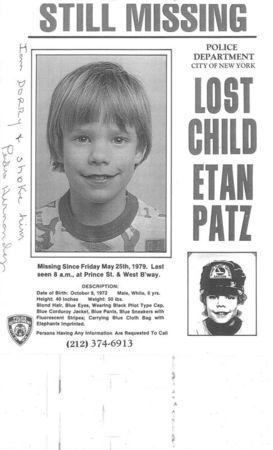No verdict yet in case of missing New York boy
By Natasja Sheriff NEW YORK (Reuters) - Jurors in the murder trial of a man who confessed to strangling 6-year-old Etan Patz in 1979 ended deliberations on Friday without reaching a verdict in the case, one of the first to highlight the plight of missing and abducted children. During the third day of deliberations in state Supreme Court in Manhattan, the panel asked to examine a missing-child poster featuring the boy, which had been introduced as evidence. The suspect, Pedro Hernandez, 54, a former Manhattan deli worker, had written on the poster: "I am sorry (and) choke him." The jury was due to resume deliberations at 9:45 a.m. (1345 GMT) on Monday. The decades-old case, which still evokes strong passions in New York, came to represent the dangers of living in the city at a time when crime rates were surging. It inspired a national campaign to put the photographs of missing children on milk cartons to raise public awareness and solicit tips to locate them. Patz's picture was one of the first to appear. The poster was one of the few pieces of physical evidence in a trial hinged on Hernandez's May 2012 confession that he choked the boy in the deli basement, stuffed him in a box and left him in an alley. Patz, who vanished on his first walk alone to a school bus stop on May 25, 1979, has never been found. He was declared dead in 2001. Defense lawyers argued that Hernandez is mentally ill, intellectually disabled and suffers hallucinations, and that his confession was coerced. Prosecutors said Hernandez told the truth when he confessed and the statement was completely voluntary. During the videotaped confession, detectives showed Hernandez a missing child poster with Patz's picture and asked him to write what he had done. Hernandez asked detectives how to spell "choke" and signed his name. The jury also asked to see a copy of Hernandez' signed statement that he understood his right to remain silent and another statement written by detectives and signed by Hernandez. The substance of the second statement was unclear. Outside the courtroom, defense attorney Harvey Fishbein said: "They're focused on some significant issues which appear to be the process by which my client's statements were taken, and those are the same issues that we stressed in the summation, and are the same issues that have concerned us from the very start of this case." (Editing by Barbara Goldberg and Ellen Wulfhorst)



